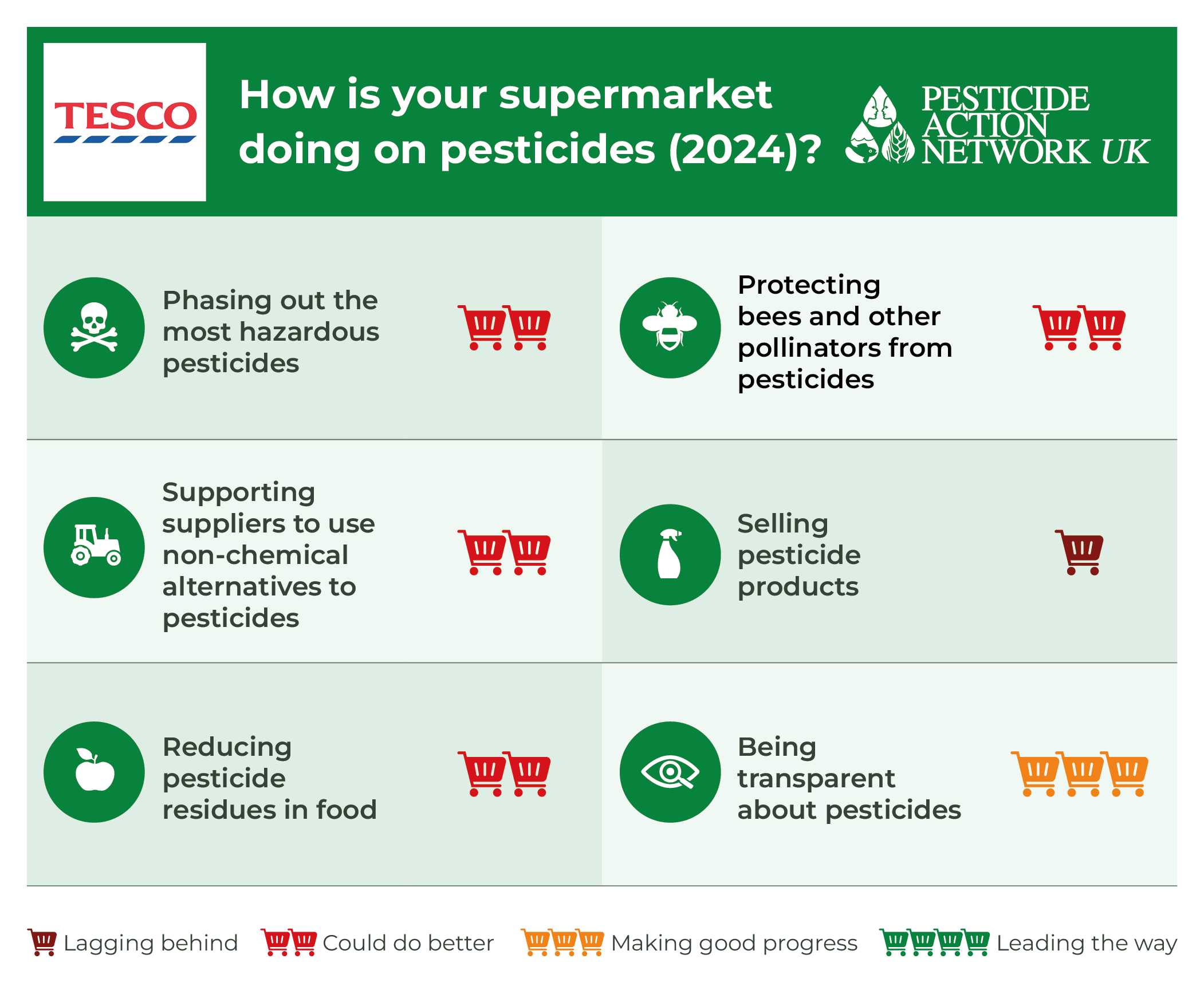Tesco
Tesco received an average overall score and came sixth out of ten supermarkets in the ranking, maintaining its position from the previous ranking in 2021. While Tesco has made a range of positive changes in the past three years, it is still doing less than some other UK supermarkets to protect human health and the environment from pesticides.

What is Tesco doing well?
Phasing out Highly Hazardous Pesticides
- Since PAN UK’s previous supermarket ranking in 2021, Tesco has committed to work towards phasing out the use of the most hazardous pesticides from its supply chains and reducing its use of all pesticides. Like almost all other UK supermarkets, the company now has lists of pesticides which are banned, restricted and monitored within its global supply chains due to their impact on human health or the environment (including wildlife and water). It also has a list of 70 pesticides that are prioritised for phase out over the next “three to ten years”. Tesco told PAN UK that it has made excellent progress in reducing the use of a number of ‘phase out’ chemicals and is currently on track to ending the use of these chemicals all together. The company added that the number of requests from its suppliers to use ‘phase out’ chemicals has reduced by 20%.
- The company has managed to reduce its use of fungicides (which are designed to prevent fresh food from rotting) through the adoption of a range of approaches including selecting varieties of fruit and vegetables less likely to rot and using cover crops to shield crops in wet climates.
Supporting suppliers to use non-chemical alternatives to pesticides
- Tesco runs peer-to-peer groups designed to bring its UK, EU and international suppliers together so they can share learnings on pesticide reduction and non-chemical alternatives. Recent topics covered by these groups include alternatives to herbicides, and how to use cover crops to protect soil, increase numbers of beneficial insects and improve biodiversity. Tesco also uses its various fora – such as its Fresh Produce Forum – to test and trial innovative non-chemical alternatives to pesticides. It hosts an annual event called Agri T-Jam which invites Agri-Tech companies to pitch new technologies, including those aimed at reducing pesticide use, which can then be passed on to Tesco growers. The company has a target of December 2025 for all of its growers around the world to be certified by sustainable farming scheme LEAF Marque.
Reducing pesticide residues in food
- Tesco tests a range of food types for pesticide residues including fruit, vegetables, herbs, species, nuts and wheat products such as bread and pasta.
Protecting bees and other pollinators from pesticides
- Tesco has restricted the use of the three most bee-toxic neonicotinoids (the insecticides notorious for driving declines in pollinator populations worldwide) and a number of other pesticides that are ‘highly toxic to bees’. This means that growers wishing to use these chemicals must apply for explicit permission from the company and provide details of their plan for minimising the impact on pollinators. Tesco also places a number of additional restrictions on growers using these chemicals, for example, that they “…can only be applied to crops without flowers…”.
What are Tesco’s priority areas for improvement?
Phasing out Highly Hazardous Pesticides
- Tesco could be making faster progress on phasing out the use of Highly Hazardous Pesticides. While the company does have lists of pesticides which it bans, flags for phase out, restricts or monitors within its global supply chains, no pesticides have been added to any of these lists since they were first published in November 2022. However, the company did tell PAN UK they plan to review and update their lists by the end of 2024. All supermarkets should be aiming for continuous improvement in terms of phasing out the most toxic pesticides and it would be great to see Tesco step up its efforts in this area.
Protecting farmworkers from pesticides
- Tesco is not doing enough to protect the health of agricultural workers using pesticides to produce food that ends up on its shelves. While the company does conduct audits of farms in high-risk countries (which include looking at health and safety risks associated to pesticides), it isn’t currently systematically monitoring pesticide poisonings throughout its global supply chain which is a major gap.
The company told PAN UK that it requires its suppliers to provide evidence that risks to workers using toxic pesticides are being dealt with, and that it only approves the use of certain pesticides if sufficient risk mitigation measures are in place. However, it did add that its efforts to phase out pesticides that pose a major risk to worker health are balanced against the need “to prevent the loss of important crops”.
On health and safety issues related to pesticides, Tesco relies largely on third-party farm assurance schemes such as GlobalG.A.P – albeit with the company’s own added ‘Tesco Nurture Standard’ – and so has less direct oversight than some other supermarkets. Tesco pointed out that it does engage growers directly via its in-country human rights teams and that its human rights programme does monitor issues relating to worker safety. However, the company did add the caveat that having direct oversight of all 9,000 of its producers would be difficult to achieve.
Supporting suppliers to use non-chemical alternatives to pesticides
- Tesco could be doing more to support its suppliers. Most notably, the company should offer training and guidance (beyond that provided by farming assurance scheme LEAF Marque) and provide bespoke advice on pesticide reduction to all of its suppliers.
Reducing pesticide residues in food
- Tesco launches an automatic investigation designed to tackle residues in food whenever its testing programme detects a residue that reaches its legal safety limit or when residues of illegal pesticides are detected in a particular food item. In contrast, the majority of other supermarkets take action when their testing detects residues of less than the legal limit (some as low as 50%). In response to this critique, Tesco told PAN UK that its suppliers are required to monitor their residue results and are notified if any residue exceeds 50% of the legal safety limit. If a residue reaches 80% of its legal limit, then Tesco follows up with the supplier in question.
Protecting bees and other pollinators from pesticides
- Tesco could be doing more to protect pollinators from pesticides. While it has restricted the use of a range of highly bee-toxic pesticides, they all remain in use within its global supply chains. The company doesn’t currently proactively fund research into the impacts of pesticides on pollinators or require its suppliers to monitor pollinator activity.
- Pesticides are still sprayed around Tesco stores and car parks. However, the company is currently running trials testing a wide range of different non-chemical alternatives to manage weeds and ultimately end pesticide use in these spaces. Promoting and protecting nature and biodiversity around its stores and other parts of its ‘estate’ is part of Tesco’s nature strategy. To help biodiversity flourish, the company should go pesticide-free around all its stores as soon as possible.
Selling pesticide products
- Tesco is one of just five of the top ten UK supermarkets still selling pesticides in its gardening range. It offers deals and discounts on pesticides which can lead to unused pesticides being poured down the sink or put in landfill, contaminating water and soil. While the company has removed the most toxic pesticides from its own-brand products, it does continue to sell both pet flea treatments and biocidal products (such as ant sprays or cockroach powders) which contain hazardous pesticides. Despite stocking less harmful alternatives such as glyphosate-free herbicides and weeding tools, the company is very much lagging behind in this area and should stop selling all products containing Highly Hazardous Pesticides as soon as possible. Tesco told PAN UK that it will “…continue to work with our suppliers to review the products we develop and sell and to make sure the ingredients we use are legal and safe when used as directed whilst maintaining a range that meets our customers’ needs”.













